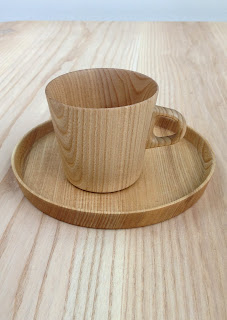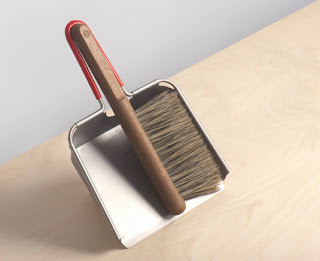THE FINAL INSTALLMENT FROM THE LONDON DESIGN FESTIVAL 2013
SIMONA KAUNAITE - LONDON
This ceramic and jewellery designer impressed me mostly for her original ideas brought to life through pottery. There were alot of beautiful and classical and timeless ceramics at the festival but Simona's work stood out to me for not only the simplicity of her pieces but the playful nature of the design.
Based at the studio A Chair and a Table in Hackney, Simona holds a Masters in Ceramic Arts from the Vilnius Academy of Arts. Recent projects include making work for coffee roasters Crooked Nose and Coffee Stories in downtown Vilnius, Lithuania. Her brief was to design three coffee cups for differently made coffee; espresso, black and black. The porcelain cups reflect the artisan roaster's simple aesthetic with colour, decoration and shape.
CATHERINE AITKEN - LONDON
Scottish designer Catherine Aitken designs furniture and interior products by playing with pattern and combinations of wood, textile and ceramics . With a fascination of pattern, fade, change and flux, Catherines design process results in pieces that frequently leave
space for arranging and rearranging. She produces quietly beautiful products that encourage interaction and
establish a poetic relationship with their surrounding environment. Her Fade Stool below is the piece that caught my eye at the festival. Made from cotton cord, plywood and powder-coated steel it reveals a gradual change
in intensity through increasing and decreasing levels of colour and at
the same time altering the presence of a particular material, whether that be cotton, wood or steel.
Fade Stool
BENJAMIN BOYCE - LONDON
Benjamin Boyce is a carpenter who trained at the Building Craft College in London between 2008-2011 and now works from his East London design studio, specialising in the craft of fine furniture. The philosophy of William Morris to 'have nothing in your house that you do not know to be useful, or believe to be beautiful' guides the style of his contemporary fitted and free standing pieces.
Benjamin's work was recognised at the New Design Britain Awards in 2011 where he won the 'Best Furniture' category. I saw the' Lean to Shelf' below in the flesh and had to squeal quietly behind my hand. Made from a mixed of recycled and reponsibly sourced oak and veneered
mdf. The shelf leans against any wall and has small recycled glass lab wear
that can be used for the vases.
Lean to shelf
Another design that incorporates Benjamin's signature playful spirit with his exacting carpentry standards is the light and bowl table. Made from American white oak with American black walnut wedges, the legs
and bowl of the table have been hand turned. A simple but elegant little coffee
table with a bowl for bits and space for a light. Terrific!
Light and Bowl table
LOVELY PIGEON - SCOTLAND
Of the smaller exhibitors at the festival I was drawn to a stall by Kirsty of Lovely Pigeon. Lovely Pigeon is based in Cellardyke, a fishing village on the East
coast of Scotland. Kirsty is a printmaker, illustrator and jeweller. I was stopped in my tracks by her collection of 'Metals' stationary - handmade notebooks and cards with copper foiled covers. Watch this space!
This festival had alot of great spark, innovation and providence coming from young design studios (especially those of East London) but I can't finish my round up of some of the best that the festival had to offer (in my humble opinion) without a mention of two of Britain's time honoured and favourite studios... Branksome and Ercol.
BRANKSOME - STOKE ON TRENT
Established in 1945, founder Ernest Baggaley recognised the cost implications of gas-fired kiln production in post-war England. He knew his wares would have to be distinctive enough in quality and design to justify their price. Branksome China was shown at the British Industries Fair in 1947 and quickly became one of the country's most desirable tableware brands. Bought and used by Queen Mary, by 1955 Branksome was exported all over the Commonwealth. A particularly
popular design was Graceline, a range of twin-tone pastel tableware
made in sixteen colourways. Though production has been large, this tableware has always been hand painted and hand finished. Graceline is now much sought-after by Branksome
collectors, 1950s enthusiasts and me.
Therefore, I was stoked (excuse the pun), when I discovered at the design festival that Branksome are re-issuing their instantly
recognisable two tone designs. While production has moved to Stoke-on-Trent,
Branksome's collectable shapes and colour palette remain
unchanged for over 60 years. I still prefer the vintage wares more than the new wares, their is a slightly different feel - maybe that is due to the many hands that have held them over the years. It is nice however to know that production of this classic stuff is to continue!
Ernest baggaley directing
Branksome new and old
ERCOL - BUCKINGHAMSHIRE
Most people interested in Bristish design and it's history will be familiar with ercol. ercol was founded in 1920 by a young Italian immigrant, Lucian
Ercolani, whose simple goal was to make furniture that was well designed
and made in a good working environment by craftsmen who really took
pride in their jobs. He started his own
business in High Wycombe, the chairmaking capital of England. Here he
perfected the technique of steam-bending wood in large quantities to
form the famous Windsor Bow, and discovered how to 'tame' elm; a
beautifully grained hardwood other furniture makers considered
impossible to work with.
The first workshop
Design for comfort, function and beauty has always been at the heart of ercol. The design has evolved over time to reflect the way we are living but it continues to reference the history of ercol and their high standards of innovation, quality craftsmanship and practicality. Caring for the environment from which the materials are sourced comes
naturally to the family owned private company, with their purpose-built energy efficient factory housing a biomass
boiler fuelled by their wood waste, their avoidance of solvent based
finishes in favour of more environmentally friendly water based
finishes, and of course in their use of sustainable timber to make their
furniture. At the festival I was made aware of a re-issue of the famous ercol Loveseat which is an extension of the traditional Windsor chair making skills.
The ercol Windsor Chair
The vintage ercol Loveseat
The contemporary ercol Loveseat
The re-issued Loveseat I spied at the festival
The Butterfly Chair
The Holland Park Chair
ercol make more than just seating but it is their chairs that they are famous for and it seems their chairs are as popular as ever as they are being used in more and more UK eateries.
Most recently, the ercol Holland Park Chair has been selected for
both Hugh Fearnley-Whittingstall’s River Cottage Canteen in Bristol and
The Perkin Reveller, a new restaurant located at Tower Wharf outside the
Tower of London.
ercol’s Holland Park Chair at The Perkin Reveller, London
I recently bought my first ercol chair after being tipped off by a friend, it is an elderly Windsor which I have had lovingly restored and re-upholstered and I have to say it is already deeply loved. Cheers ercol.





















































